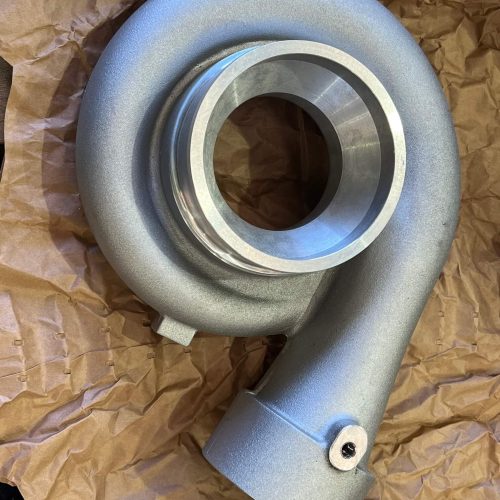Discover how TP Castings uses heat-resistant non-ferrous metals to enhance turbo housing performance. A must-read guide for engineers and manufacturers.
Turbocharger housings are critical components in modern internal combustion engines, especially in performance-focused and heavy-duty applications. These housings must endure extreme temperatures, rapid thermal cycles, and high-pressure conditions. The materials used in turbocharger housing construction significantly influence both efficiency and durability, with heat-resistant non-ferrous metals proving to be superior alternatives to traditional ferrous options due to their enhanced performance, reduced weight, and greater thermal resistance.
Why Heat Resistance Matters in Turbocharger Housings
Turbochargers operate under intense conditions, often reaching exhaust temperatures of more than 900°C. Such thermal stress necessitates materials that maintain their structural integrity without warping, cracking, or degrading over time. Heat resistance is not merely about withstanding high temperatures, but also about resisting oxidation, corrosion, and thermal fatigue. Materials that fail to withstand thermal stress can lead to early failure and higher maintenance, making heat-resistant choices essential for reliable, long-lasting turbocharger systems.
The Limitations of Ferrous Metals in High-Temperature Applications
While ferrous metals such as cast iron and certain steel alloys have been commonly used in turbo housing manufacturing, they are not without limitations. These materials often exhibit higher thermal expansion rates, making them prone to cracking or warping under repeated heating and cooling cycles. Ferrous metals are heavier and more prone to oxidation and corrosion at high temperatures, reducing vehicle efficiency and material lifespan in demanding conditions.
Top Heat-Resistant Non-Ferrous Metals Used in Turbo Housings
Non-ferrous metals are now preferred in many advanced turbocharger designs due to their superior heat resistance, lower weight, and enhanced durability. Below are some of the top heat-resistant non-ferrous metals commonly utilised in turbo housing applications:
• Inconel (Nickel-Chromium-Based Superalloys) – Inconel is a high-performance alloy primarily composed of nickel and chromium, known for its outstanding resistance to heat and oxidation. Inconel, with strength retention above 1000°C and excellent resistance to thermal fatigue and corrosion, is ideal for high-performance turbocharger applications.
• Titanium Alloys – Titanium and its alloys offer an exceptional strength-to-weight ratio and good thermal stability. Despite being costlier and harder to machine, titanium alloys offer excellent high-temperature performance, weight reduction, and corrosion resistance for specialised applications.
• Copper-Based Alloys – Though less common, certain copper-based alloys are utilised for their superior thermal conductivity, aiding in heat dissipation. Copper alloys, though unsuitable for all turbo housing designs, are effective in niche applications requiring rapid heat transfer when used appropriately.
To further understand the differences between ferrous and non-ferrous metals, explore this informative guide from Metal Men Recycling: Ferrous vs Non-ferrous Metals.
Partnering with TP Castings for Superior Heat-Resistant Solutions
Choosing the right heat-resistant non-ferrous metals for turbocharger housings is vital to ensuring long-term performance and reliability. With over 35 years of experience, TP Castings is a trusted Australian manufacturer delivering precision-engineered non-ferrous castings for demanding automotive applications. From Inconel to titanium and aluminium alloys, our advanced foundry capabilities ensure high-performance solutions tailored to your project’s needs.
Explore more of our precision-engineered casting solutions by visiting our gallery at TP Castings Gallery.

